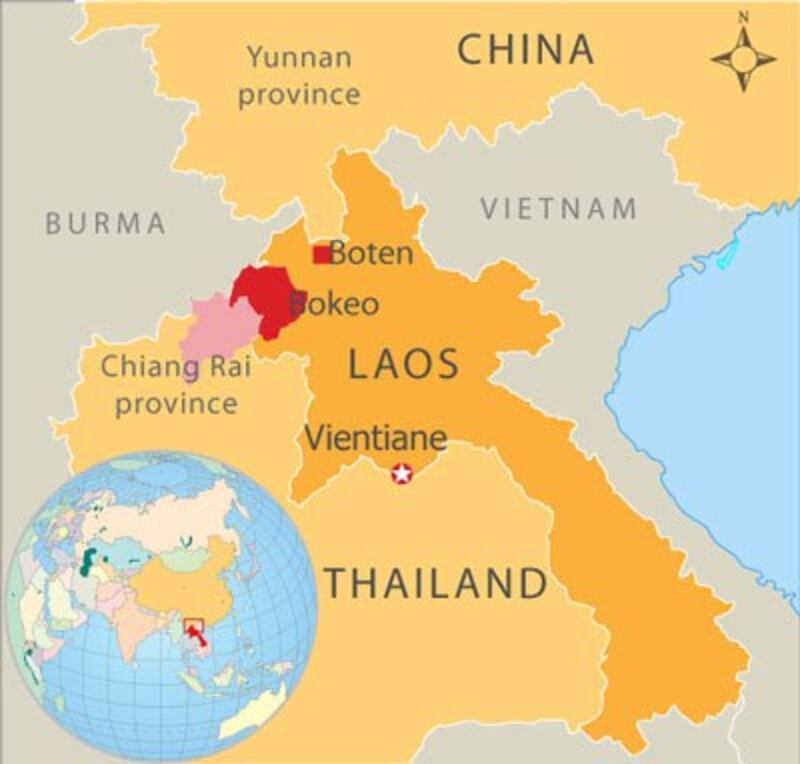Wealthy Chinese tourists are being allowed exclusive access to a casino in northern Laos, which was ordered to close more than a month ago due to allegations of illegal activities, according to a source.
The source from Boten, where the Chinese-owned casino is located on the border of China’s Yunnan province, told RFA that groups of tourists continue to travel to Golden Boten City Casino with the guarantee that the facility will be open to them.
“The casino is always open for service,” said the source who asked to remain anonymous, but said he had gambled at the casino, which operates inside the Boten special economic zone (SEZ) controlled exclusively by Chinese investors.
“The Chinese government ordered it to close, but rich Chinese can still gamble. People without a lot of money can’t play.”
According to reports, Chinese officials ordered the Golden Boten City Casino to close in May following allegations that the business was linked to money laundering, murder, fraud, kidnapping, drugs, human trafficking, and the sex trade.
But Lao officials in Luang Namtha province, where the SEZ is located, say they were told the casino had only been closed for renovations.
Casino owners said Chinese officials have no authority to investigate the allegations of illegal activities, and that the responsibility lies with the local Lao government.
But reports indicate that local authorities are unable to conduct investigations into operations within the zone, which is sealed off by a private security force and “protected” by officials in the Lao central government with ties to the casino.
Chinese investment
Golden Boten City Casino leased the site from the Lao government for up to 60 years.
At Boten, front-desk hotel staff speak only Chinese, the Chinese yuan is the required currency of payment, and Chinese prostitutes peddle their services on business cards printed in Mandarin rather than Lao, according to the Internet publication, Asia Times Online.
Boten was once a small Lao village, but the 21-square-kilometer (13-square-mile) area was declared a SEZ in 2002 after residents were each given U.S. $800 and told to leave the vicinity.
Investors have since capitalized on strict rules prohibiting gambling in China to lure wealthy Chinese tourists across the border.
In December, investors announced the opening of another casino in a Chinese-run SEZ in Bokeo province, which officials and tour operators have said could house 200,000 mostly Chinese workers and their families as part of ongoing expansion plans in the zone.
The Lao communist government signed over the 10,000 hectare (24,710 acre) zone to the Chinese investors on a 99-year lease basis, according to The Diplomat, an online international current-affairs magazine for the Asia-Pacific region.

Easy money
The Lao government sees gambling as an easy way to bring in money from China that it can later use to develop the region. It has offered a number of tax breaks and land concessions to attract Chinese investments, which also include a number of rubber plantations.
The army has forced hundreds of Laotians off of their land to make room for foreign investment in SEZs.
Once established, investors are allowed to act with near impunity, according to reports which say that endorsing a 14-day free entry stamp into foreign visitors’ passports is about the only remaining semblance of authority still exercised by the host Laotian government in the zones.
On March 9, 2010, the Chinese Ministry of Foreign Affairs issued a warning urging Chinese citizens not to gamble in Laos.
The warning claimed that Lao-based casinos cheat Chinese customers by providing them with usurious rates of credit. When they are unable to repay the debts, the statement said, the gamblers are detained and beaten.
A number of escaped gamblers have given interviews detailing the inhumane treatment they suffered while held hostage, including torture at the hands of captors who demand ransoms from family members back in China.
Other gamblers told how they were lured to the casino with promises of free flights, accommodation, gambling credit, and meals.
Reported by RFA’s Lao service. Translated by Bounchanh Mouangkham. Written in English by Lauren Littleton.
